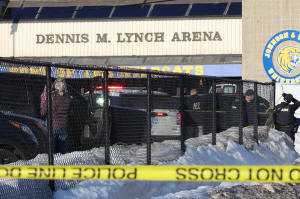Shooter killed ex-wife and a son in Rhode Island ice rink attack, police
say
[February 18, 2026]
PAWTUCKET, R.I. (AP) — The person who opened fire Monday during a youth
hockey game at a Rhode Island ice rink was specifically targeting family
members, killing an ex-wife and son as many fans dived for cover while a
handful rushed the shooter to stop the attack, authorities said.
Pawtucket Chief of Police Tina Goncalves said the shooter's ex-wife
Rhonda Dorgan and adult son Aidan Dorgan were killed and three others
were injured: Rhonda Dorgan's parents, Linda and Gerald Dorgan, and a
family friend Thomas Geruso, all of whom remained in critical condition
Tuesday afternoon, Goncalves said
Police identified the shooter as 56-year-old Robert Dorgan, who died
from an apparent self-inflicted gunshot wound. Dorgan also went by the
names Roberta Esposito and Roberta Dorgano, authorities said.
Goncalves said there was “no indication” there would be violence at the
ice rink in Pawtucket on Monday afternoon, adding that Dorgan had been
to many hockey games to watch family members play before without
incident.
Gender identity apparently was a contributing factor to Dorgan’s wife
filing for divorce in 2020 after nearly 30 years of marriage.
Court filings show Rhonda Dorgan initially wrote “gender reassignment
surgery, narcissistic + personality disorder traits” as reasons for
filing but crossed that out and wrote “irreconcilable differences which
have caused the irremediable breakdown of the marriage.”

Court documents show that two shared the same last name even prior to
getting married. Authorities have not provided additional details about
the same name.
Under the name Roberta Dorgano, Dorgan posted on X that Rhonda Dorgan
“hates the person who stole her husband” while posting about the
couple’s marital troubles in 2018. A year later Dorgan wrote on social
media: “Transwoman, 6 kids : wife – not thrilled,” and encouraged people
to not let being transgender stop them from creating a family.
A day before the shooting, Dorgan responded on X to anti-transgender
posts by actor Kevin Sorbo and Infowars conspiracy theorist Alex Jones
by saying that constant criticism of transgender people is “why we Go
BERSERK.”
Brutal attack ended when fans rushed to stop shooter
Goncalves on Tuesday credited several “good Samaritans” who intervened
and quickly stopped the attack
At least three bystanders were able to contain Dorgan in the middle of
the stands as the crowd fled and ran around them, but said Dorgan was
still able to reach for a second firearm and died of a self-inflicted
gunshot, Goncalves said.
The hockey game was livestreamed by LiveBarn, a streaming platform for
youth sporting events, whose videos have been shared on social media
showing players on the ice as popping sounds are heard. Chaos quickly
unfolds as players on benches dive for cover, those on the ice
frantically skate toward exits and fans flee their seats.
LiveBarn’s social media account has been issuing warnings to those who
shared the video that they do not have permission to do so.
Michael Steven, who recorded video after the shooting, recalled crying
parents trying to locate their children outside the arena and young
people being taken out on stretchers.

[to top of second column]
|

Police and ATF agents stand near the Lynch Arena in Pawtucket, R.I.,
after a shooting at the ice rink, Monday, Feb. 16, 2026. (AP
Photo/Mark Stockwell)

“It happens far too often in our nation,” Steven told reporters.
Members of the community held a vigil at Slatersville Congregational
Church in North Smithfield in the evening Tuesday.
“It’s absolutely mind-boggling that this could happen to people we know
and love and support through everything,” said Amy Goulet, whose son is
a hockey player in the community.
Shooter known for bad temper, co-worker says
Dorgan was an employee of General Dynamics Bath Iron Works, a ship
building facility in Bath, Maine, that contracts with the U.S. Navy,
David Hench, a spokesperson for the shipyard, said Tuesday. Co-workers
said Dorgan often used the first name Roberta at work.
A colleague, Destiny Mackenzie, recalled that she and Dorgan would often
talk about family. Mackenzie said Dorgan's ex-wife never came up in
conversation but a hockey-playing son was a frequent topic.
“What was supposed to be some seniors' only chance at playoff games is
now ruined,” she wrote in a message to The Associated Press. “Images
that these kids and family’s now have to live with. That’s who I send my
condolences to is those families."
Mackenzie also said Dorgan had a bad temper that sometimes led to
screaming matches with colleagues.
Another co-worker said Dorgan appeared to be split on the issue of
transgender acceptance, one second being proud of transitioning and the
next, embarrassed. That co-worker, who spoke on condition of anonymity
for fear of workplace reprisals, said they knew Dorgan owned guns but
was unsure how many.
Dorgan briefly served in the Marine Corps, enlisting on April 26, 1988,
according to military records provided by the service. Less than three
months later, on July 13, Dorgan was separated from the service with the
lowest military rank.

Maj. Jacoby Getty, a Marine Corps spokesman, told The Associated Press
that the rapid discharge indicated Dorgan's character "was incongruent
with Marine Corps’ expectations and standards.”
Getty declined to provide more detail.
Monday’s shooting came nearly two months after the state was rocked by a
shooting at Brown University that killed two students and wounded nine
others, as well as left a Massachusetts Institute of Technology
professor dead. Authorities later found Claudio Neves Valente, 48, dead
from a self-inflicted gunshot wound at a New Hampshire storage facility.
___
Casey reported from Boston, and Whittle from Portland, Maine. Associated
Press writer Konstantin Toropin in Washington contributed.
All contents © copyright 2026 Associated Press. All rights reserved |